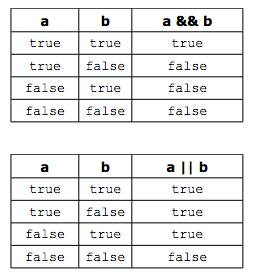- Return to book
- Review this book
- About the author
- Introduction
- 1. C++ programming language
- 2. C++ basics
- 3. Flow control
- 4. Functions
- 5. Arrays and Strings
- 6. Pointers
- 7. Classes and structs
- 8. Object-Oriented Programming
- 9. Memory Management
- 10. Advanced topics I
- 11. Advanced topics II
- 12. Exercises: miscellaneous
- 13. GDB
Operators
Conditionals (if statements) use two kinds of special operators: relational and logical. These are used to determine whether some condition is true or false.
Relational Operators
The relational operators are used to test a relation between two expressions:
| Operator | Meaning |
|---|---|
| > | Greater than |
| >= | Greater than or equal to |
| < | Less than |
| <= | Less than or equal to |
| == | Equal to |
| != | Not equal to |
They work the same as the arithmetic operators (e.g., a > b) but return a Boolean value of either true or false, indicating whether the relation tested for holds. (An expression that returns this kind of value is called a Boolean expression.) For example, if the variables x and y have been set to 6 and 2, respectively, then x > y returns true. Similarly, x < 5 returns false.
Logical Operators
The logical operators are often used to combine relational expressions into more complicated Boolean expressions:
| Operator | Meaning |
|---|---|
| && | and |
| double pipe | or |
| ! | not |
The and and or operators return true or false, according to the rules of logic:

The not operator is a unary operator, taking only one argument and negating its value:

Of course, Boolean variables can be used directly in these expressions, since they hold true and false values. In fact, any kind of value can be used in a Boolean expression due to a quirk C++ has: false is represented by a value of 0 and anything that is not 0 is true. So, “Hello, world!” is true, 2 is true, and any int variable holding a non-zero value is true. This means !x returns false and x && y returns true.